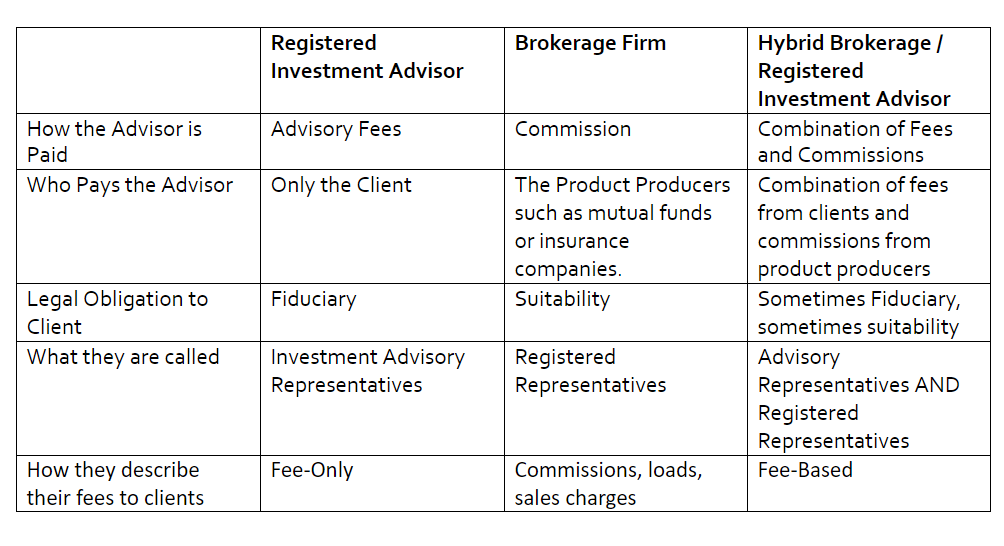Types of Financial Planning Companies

Podcast: Play in new window | Download
This article and podcast explain the different types of financial planning companies and how they get paid.
Choosing a financial planning firm to help you map out your future is not an easy task. There are several types of financial advisors who all charge clients a little bit differently. At Shotwell Rutter Baer we have chosen to be a fee-only, fiduciary, registered investment advisory firm, as we feel this serves our clients the best.
There are three main types of businesses in the investment world. Here are the things that we think you should think about and ask before you decide:
Brokerage Firms
Employees working for brokerage firms are paid to sell products. If there was any dispute about their advice, they are held to a “suitability standard,” meaning that they only need to show that the investment recommendation they made was appropriate for your circumstances, not necessarily the best recommendation available. Licensed employees of brokerage firms are known as Registered Representatives of their firms and are usually compensated through product commissions.
Registered Investment Advisory Firms
Registered investment advisory firms are paid by their clients for their advice, rather than the products that they sell. They are held to a fiduciary standard, which means they have a legal obligation to try and put your interest ahead of their own interest and their firm’s interests when making recommendations. Advisors in this business model are known as Investment Advisory Representatives of a Registered Investment Advisory firm. This business model is often referred to as a Fee-Only Firm. Shotwell Rutter Baer is this type of firm.
Registered Investment Advisor / Brokerage Hybrid (Fee-based)
To make matters more confusing, most brokerage firms also have a registered investment advisor subsidiary. These registered reps are said to be dual-registered, working as both employees of the brokerage firm on a suitability basis, paid by commissions to sell products. At the same time, they can also act as an investment advisory representative.
When they are offering advice and performing planning duties, they are supposed to be held to a fiduciary standard, but they can switch roles and offer you products on a commission basis with a suitability standard. Advisors in these types of firms often refer to themselves as Fee-Based, rather than fee-only. They can charge a fee for planning services and offer some investment advisory programs that are fee-based, but they can sell you insurance and annuities as well. In theory, they are required to explain to you when they switch roles.
Why does all this matter?
We believe that it is important for clients to have a financial planner who works for them, with their interest at heart, both philosophically and legally. A fee-only fiduciary advisor is paid for their advice, not products, and is free to recommend any investments that make sense for your situation.

If you are looking for a financial advisor, please consider Shotwell Rutter Baer. For a closer look at our process please check out our Strategic Reliable Blueprint.
If we aren’t the right fit for you, we will be happy to recommend some other options. We look forward to hearing from you.
About Shotwell Rutter Baer
Shotwell Rutter Baer is proud to be an independent, fee-only registered investment advisory firm. This means that we are only compensated by our clients for our knowledge and guidance — not from commissions by selling financial products. Our only motivation is to help you achieve financial freedom and peace of mind. By structuring our business this way we believe that many of the conflicts of interest that plague the financial services industry are eliminated. We work for our clients, period.
Click here to learn about the Strategic Reliable Blueprint, our financial plan process for your future.
Call us at 517-321-4832 for financial and retirement investing advice.
Share post:
